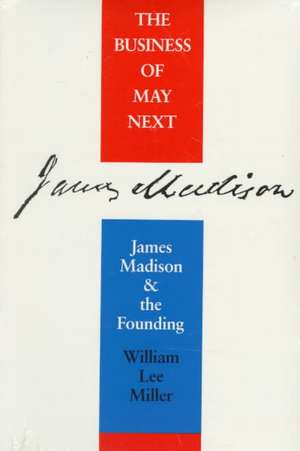Business of May Next
Autor William L. Milleren Limba Engleză Paperback – 31 oct 1993
Preț: 211.10 lei
Nou
Puncte Express: 317
Preț estimativ în valută:
40.39€ • 42.17$ • 33.43£
40.39€ • 42.17$ • 33.43£
Carte tipărită la comandă
Livrare economică 05-19 aprilie
Preluare comenzi: 021 569.72.76
Specificații
ISBN-13: 9780813914909
ISBN-10: 0813914906
Pagini: 312
Dimensiuni: 156 x 216 x 19 mm
Greutate: 0.45 kg
Ediția:Revised
Editura: University of Virginia Press
ISBN-10: 0813914906
Pagini: 312
Dimensiuni: 156 x 216 x 19 mm
Greutate: 0.45 kg
Ediția:Revised
Editura: University of Virginia Press
Textul de pe ultima copertă
"Good fortune offered this nation an unusual chance at ideal nation-forming and... some honorable leaders seized that chance", writes William Lee Miller in The Business of May Next, and none among the founders made more of the opportunity than did James Madison, subject of this engaging work. Madison is depicted during the critical years between 1784 and 1791, when he was so active in articulating the governmental aims of the fledgling nation that he sometimes found himself in official dialogue with himself. More than simply a historical and biographical account, the book traces Madison's political and theoretical development as a means of illuminating its larger theme, the moral and intellectual underpinnings of the American nation. With a sound grasp of his material and a refreshing style Miller reveals how Madison's research into republics and his influence on the writing of the Constitution are central to the values for which the nation stands. From an examination of Madison's notes, Miller traces Madison's early research into other republics and their weaknesses. He reveals how Madison's thinking shaped the Virginia Plan, which, in turn, shaped the United States Constitution and the nation's institutions. The author writes that Madison sought the strands of Republicanism in history and gave republican ideals new and lasting institutional expression. He shows how the making of republican institutions became a collaboration, and how the newly created institutions contained within themselves provision for their own continuing alteration and for the involvement and influence of collective humanity down through the years. Miller follows Madison through the Constitutional Convention("the business of May next") to the great national argument on behalf of the Constitution, notably through the Federalist papers. Of particular interest are his discussions of the constitutional deliberations over religious freedom and the institution of slavery.






















